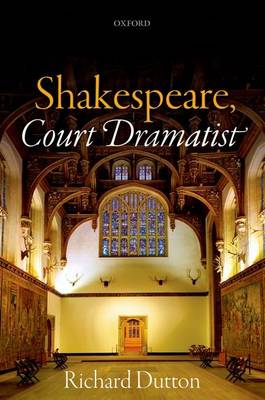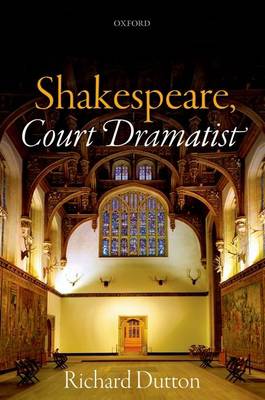
- Afhalen na 1 uur in een winkel met voorraad
- Gratis thuislevering in België vanaf € 30
- Ruim aanbod met 7 miljoen producten
- Afhalen na 1 uur in een winkel met voorraad
- Gratis thuislevering in België vanaf € 30
- Ruim aanbod met 7 miljoen producten
Zoeken
Omschrijving
Shakespeare, Court Dramatist centres around the contention that the courts of both Elizabeth I and James I loomed much larger in Shakespeare's creative life than is usually appreciated. Richard Dutton argues that many, perhaps most, of Shakespeare's plays have survived in versions adapted for court presentation, where length was no object (and indeed encouraged) and rhetorical virtuosity was appreciated. The first half of the study examines the court's patronage of the theatre during Shakespeare's lifetime and the crucial role of its Masters of the Revels, who supervised all performances there (as well as censoring plays for public performance). Dutton examines the emergence of the Lord Chamberlain's Men and the King's Men, to whom Shakespeare was attached as their 'ordinary poet', and reviews what is known about the revision of plays in the early modern period. The second half of the study focuses in detail on six of Shakespeare's plays which exist in shorter, less polished
texts as well as longer, more familiar ones: Henry VI Part II and III, Romeo and Juliet, Henry V, Hamlet, and The Merry Wives of Windsor. Dutton argues that they are not cut down from those familiar versions, but poorly reported originals which Shakespeare revised for court performance into what we know best today. More localized revisions in such plays as Titus Andronicus, Richard II, and Henry IV Part II can also best be explained in this context. The court, Richard Dutton argues, is what made Shakespeare Shakespeare.
texts as well as longer, more familiar ones: Henry VI Part II and III, Romeo and Juliet, Henry V, Hamlet, and The Merry Wives of Windsor. Dutton argues that they are not cut down from those familiar versions, but poorly reported originals which Shakespeare revised for court performance into what we know best today. More localized revisions in such plays as Titus Andronicus, Richard II, and Henry IV Part II can also best be explained in this context. The court, Richard Dutton argues, is what made Shakespeare Shakespeare.
Specificaties
Betrokkenen
- Auteur(s):
- Uitgeverij:
Inhoud
- Aantal bladzijden:
- 336
- Taal:
- Engels
Eigenschappen
- Productcode (EAN):
- 9780198822257
- Verschijningsdatum:
- 5/06/2018
- Uitvoering:
- Paperback
- Formaat:
- Trade paperback (VS)
- Afmetingen:
- 231 mm x 155 mm
- Gewicht:
- 498 g

Alleen bij Standaard Boekhandel
+ 87 punten op je klantenkaart van Standaard Boekhandel
Beoordelingen
We publiceren alleen reviews die voldoen aan de voorwaarden voor reviews. Bekijk onze voorwaarden voor reviews.











